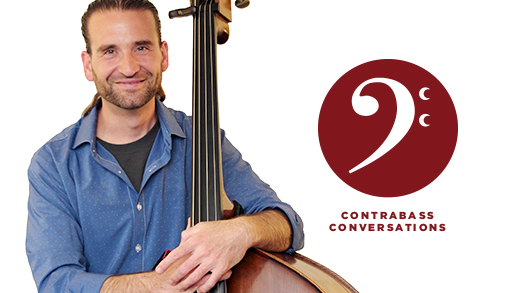Today’s show features Brandon McLean, who just won the associate principal bass position for the Pittsburgh Symphony. Brandon has most recently served as principal bass of the Colorado Symphony, and prior to that he held positions in the Vancouver Symphony and the Florida Orchestra. Originally from Seattle, Brandon did his undergrad at the University of North Texas, his masters at the Boston Conservatory, and studied at Carnegie Mellon after that with Pittsburgh Symphony principal bassist Jeff Turner. He played in the New World Symphony before landing his first gig with the Florida Orchestra.
We dig into the details of the audition process, like how Brandon starts preparing long-term for the audition and how that preparation changes as the audition approaches, Brandon’s technique routine, which he keeps up throughout the audition process, the benefits of getting to practice in a large space like a concert hall, and routines in the days prior to the audition. We also feature excerpts of Brandon performing the Dave Anderson Duets with Brendan Kane.
Books mentioned:
Interview Highlights
Audition Preparation Strategies
- the process starts right after finding out what the list is
- looks at what are the more problematic excerpts for him and begins by spending time on those
- about 5 weeks out, he starts to get more disciplined
- for a long time did the system of ranking what the more difficult excerpts are and spending the most time on those, but he found that then the audition would come up and they’d ask for the excerpts that he didn’t spend as much time on
- breaks up practice session into 10 minute increments; practices for an hour or an hour-and-a-half in a couple of different segments in the day
- keeps himself disciplined to no more than 10 minutes on a specific excerpt
- breaks up the last as many ways as possible:
- top to bottom
- bottom to top
- skip and do every 3rd excerpt
- 2-3 weeks out, he shortens that 10 minutes per excerpt to 3-4 minutes per except so that he’s hitting everything briefly just about every day
- Brandon generally runs things at 75% tempo most of the time
- he can generally play this under tempo—it’s getting them up to tempo that’s the real issue
- there’s some point between that 75% and 100% tempo that he can usually solve most of the technical problems
- problems associated with fast excerpts were dealt with away from those excerpts – dealing with technical studies that helped
- during audition prep, Brandon still spends at least 30-45 minutes still doing scales and technical exercises
- he cuts that down when getting really close to the audition
Brandon’s Technique Routine
- pick a scale
- slow bow practice (whole notes) using Intonia software
- then does a different scale with half notes, quarter notes, etc – gets himself playing pretty quickly
- do something similar with arpeggios after that
- right hand practice
- string crossings
- spiccato
- exercises to get his right hand moving a little quicker
Playing in a Large Space and Recording
- the benefits of getting to practice in a large space (concert hall) – he didn’t get this until later in life
- getting over the idea that he doesn’t really know what he sounds like objectively (similar to getting over the way your voice sounds when you play back a recording)
- the angle that you play the bass – no one else will ever hear your bass playing from that angle—it’s such a specific thing
- things started to turn on the audition front for Brandon when he started to get really serious about recording himself
- Brandon had a pretty steady path of progress in auditioning – not advancing, then getting to semis, then making finals, then runner-up for a bunch of auditions
- Brandon realized at a certain point that he just wasn’t a very natural audition taker
- had to start treat audition taking as his job
- dealing with the mental discipline of audition taking was something that took him a while to get a grasp of
- Don Greene books helpful in terms of centering, etc.
- Brandon has gotten away from thinking that he just needed to have a really good day to win an audition
- after teaching students and observing them nervous and not nervous, he has concluded that there isn’t nearly as much difference in the two states as the students think
- When he wasn’t doing well in auditions, he had actually lost those auditions months in advance
Routines as the Audition Approaches
- usually flies in the day before – flying in too early usually psyched him out
- it’s amazing what tiny things can seep into your mind during an audition
- when he goes, he generally doesn’t talk to people at the audition
- running is helpful
- doesn’t try to change anything lifestyle-wise coming up to the audition – changes only cause problems
Links from Listener Feedback:





